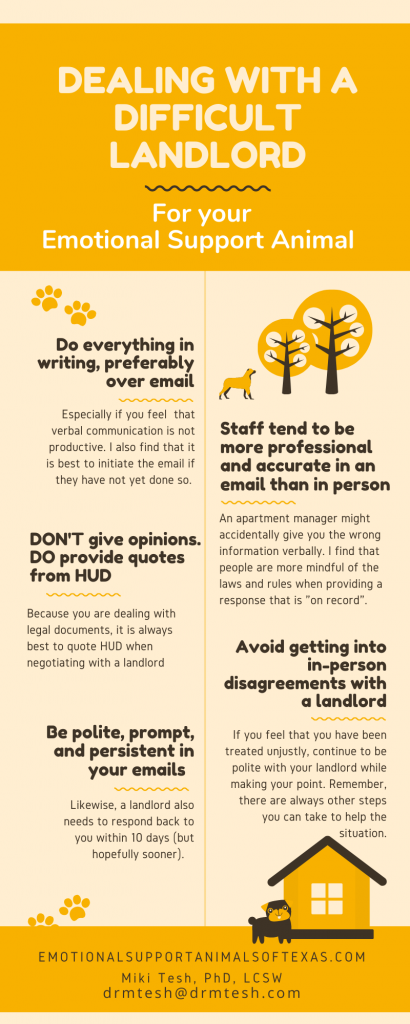My experience has been that the majority of the time, landlords understand the laws regarding fair access to housing, and the process goes through smoothly for you and your emotional support animal or psychiatric service animal. On rare occasions, however, a landlord may reject the accommodation request. If your emotional support animal letter is not accepted by your landlord or apartment complex, you have a variety of options to resolve the issue. First, ask the landlord if there is anything else that they need in order to accommodate your ESA request. If so, reach out to me to follow up on any extra steps I may need to complete to help facilitate the process. Sometimes landlords have certain forms they want signed by me as the Licensed Mental Health Provider (LMHP). Sometimes, they want to call and talk to me, or they may want an email confirmation that I am an LMHP and wrote the letter. A landlord may also use a third party verification system. Either way, reach back out to me as needed so that I can assist with the full process for your ESA or Service Animal needs. If the landlord still does not accept your ESA or PSA request after working with them, ask them to send you something in writing stating the reason for rejection so that the issue can be resolved. Occasionally, I may need to write a second letter as a response to landlord when the request is not approved. I always keep in mind the parameters that landlords are limited to requesting in order to protect your Protected Health Information (PHI) based on HIPAA federal law. If a landlord asks for information that extends beyond the type of information that they are allowed to ask, I gently remind them of what health information I can and cannot share, and sometimes show documentation from HUD that outlines what should be included in an accommodation letter for an ESA or PSA.

How to deal with problems that may arise
CERTIFICATIONS AND REGISTRATIONS Problem: The apartment management tells me that I need a special certificate or registration, that my accommodation letter is not proper documentation Response: Emotional support animal certifications or registrations are not necessary, according to ADA, HUD, DOJ, or FHA laws. The main legal document you need is an accommodation letter written by a licensed health care provider in your state of residence. Sometimes people use the term "certification" or "registration," however they really mean an accommodation letter. Occasionally a landlord might insist on a specific type of certification or registration because they are unaware of the law. "Covered entities may not require documentation, such as proof that the animal has been certified, trained, or licensed as a service animal, as a condition for entry. There are individuals and organizations that sell service animal certification or registration documents online. These documents do not convey any rights under the ADA and the Department of Justice does not recognize them as proof that the dog is a service animal." -See Q7 of this ADA link "Some websites sell certificates, registrations, and licensing documents for assistance animals to anyone who answers certain questions or participates in a short interview and pays a fee. Under the Fair Housing Act, a housing provider may request reliable documentation when an individual requesting a reasonable accommodation has a disability and disability-related need for an accommodation that are not obvious or otherwise known.35 In HUD’s experience, such documentation from the internet is not, by itself, sufficient to reliably establish that an individual has a non-observable disability or disability-related need for an assistance animal. By contrast, many legitimate, licensed health care professionals deliver services remotely, including over the internet. One reliable form of documentation is a note from a person’s health care professional that confirms a person’s disability and/or need for an animal when the provider has personal knowledge of the individual." -See page 11 of HUD Document
ID or VESTS Problem: The apartment management insists that my animal have an ID, badge, or wear a special harness Response: You and your animal never have to publicly identify your animal with pet gear or a special ID. The only entity that can ask to see your accommodation letter would be your apartment management, hotel, or your work (if for a workplace accommodation). "The ADA does not require service animals to wear a vest, ID tag, or specific harness." -See Q8 of this ADA link
WHAT DOCUMENT IS RECOMMENDED Problem: How do I communicate with the apartment manager on the type of legal document needed for my emotional support animal or service animal? Response: HUD recommends that individuals in need obtain an accommodation letter from a licensed health care provider for your state. "One reliable form of documentation is a note from a person’s health care professional that confirms a person’s disability and/or need for an animal when the provider has personal knowledge of the individual." -See page 11 of HUD Document
REQUEST ACCOMMODATION AFTER BRINGING ANIMAL HOME Problem: My landlord states I broke the lease contract because I showed them the letter after bringing the animal to my residence. Response: You are allowed to show your letter to the landlord either before or after bringing your animal home. There should not be a "penalty" for showing a letter after bringing your animal home . “A resident may request a reasonable accommodation either before or after acquiring the assistance animal.25 An accommodation also may be requested after a housing provider seeks to terminate the resident’s lease or tenancy because of the animal’s presence, although such timing may create an inference against good faith on the part of the person seeking a reasonable accommodation. However, under the FHA, a person with a disability may make a reasonable accommodation request at any time, and the housing provider must consider the reasonable accommodation request even if the resident made the request after bringing the animal into the housing.26 -See page 8 of HUD Document
PET FEES Problem: My landlord still wants to charge me a pet deposit or pet fee. Response: You should never be charged a pet fee, pet deposit, or pet penalty for having an emotional support animal or service animal. “A housing provider may not charge a deposit, fee, or surcharge for an assistance animal. A housing provider, however, may charge a tenant for damage an assistance animal causes if it is the provider’s usual practice to charge for damage caused by tenants (or deduct it from the standard security deposits imposed on all tenants).” -See page 14 of HUD Document
MORE THAN ONE ASSISTANCE ANIMAL Problem: My landlord has a pet limit Response: You are allowed more than one assistant animal, so long as the animals attend to different needs, differently. Also, your emotional support animals are not pets, by legal definition. They are defined as assistant or service animals. "While most requests for reasonable accommodations involve one animal, requests sometimes involve more than one animal (for example, a person has a disability-related need for both animals, or two people living together each have a disability-related need for a separate assistance animal). The decision-making process in this guidance can be used for all requests for exceptions or modifications to housing providers’ rules, policies, practices, and/or procedures so persons with disabilities can have assistance animals in the housing where they reside." -See page 4 of this HUD link. "Q13. Can people bring more than one service animal into a public place? A. Generally, yes. Some people with disabilities may use more than one service animal to perform different tasks. For example, a person who has a visual disability and a seizure disorder may use one service animal to assist with way-finding and another that is trained as a seizure alert dog. Other people may need two service animals for the same task, such as a person who needs two dogs to assist him or her with stability when walking. Staff may ask the two permissible questions (See Question 7) about each of the dogs. If both dogs can be accommodated, both should be allowed in." -See Q13 at this ADA link. "Assistance animals are not pets. They are animals that do work, perform tasks, assist, and/or provide therapeutic emotional support for individuals with disabilities" - See page 3 of this HUD document
BREED RESTRICTIONS Problem: My landlord states I am not allowed to have a certain breed, size, or age of an animal Response: By legal definition, an esa or service animal is not a "pet," and therefore "pet rules" no longer apply. "Pet rules do not apply to service animals and support animals. Thus, housing providers may not limit the breed or size of a dog used as a service animal or support animal just because of the size or breed." -See page 14 of HUD Document
DOCUMENTATION FROM THE INTERNET Problem: My landlord told me they will not accept anything from the internet. Response: The main "internet" issue concerns websites selling "certificates," "registrations," "IDs," or letters from providers who are not licensed in the state you reside. Also, you must have an in-person telehealth visit with your provider to have a clinical provider/patient relationship. I provide telehealth visits for for people who live in Texas. HUD states: "many legitimate, licensed health care professionals deliver services remotely, including over the internet. One reliable form of documentation is a note from a person’s health care professional that confirms a person’s disability and/or need for an animal when the provider has personal knowledge of the individual." -See page 11 of HUD Document
DOES NOT OFFER ADEQUATE EXPLANATION FOR DENIAL Problem: My landlord denied my accommodation, but did not tell me why? Response: Ask your landlord (in writing) why the accommodation was denied. Once you know their reason, then you can take steps to provide the information that may have been missing. Stay in touch with me so that I can be of assistance. "Before denying a reasonable accommodation request due to lack of information confirming an individual’s disability or disability-related need for an animal, the housing provider is encouraged to engage in a good-faith dialogue with the requestor called the “interactive process." -See page 14 of HUD Document
TAKING A LONG TIME TO RESPOND Problem: My landlord is taking a very long time to get back to me Response: You should get an “accepted” or “denied” response within 10 days. "As a best practice, the housing provider should make a determination promptly, generally within 10 days of receiving documentation." -See page 13 of HUD Document
LANDLORD WANTS MORE DETAILS ABOUT MY MENTAL HEALTH Problem: My landlord states that the letter doesn't share enough information. Response: Typically, I try to construct an accommodation letter based on the outlined recommendation from HUD. In doing so, I keep in mind to provide only enough private health information that is necessary to meet the requirements. However, sometimes landlords want more details about your mental health treatment. If you receive a request like this, it is at your discretion regarding how much information you feel comfortable sharing. HUD recommends a good faith dialog but discourages questions that get into diagnosis, severity, or treatment. "The housing provider may not insist on specific types of evidence if the information which is provided or actually known to the housing provider meets the requirements of this guidance (except as provided above). Disclosure of details about the diagnosis or severity of a disability or medical records or a medical examination cannot be required." -See page 14 of HUD Document
GUESTS WITH ESA Problem: The ESA belongs to a family member, friend, or partner who is not on my lease. Response: If someone else is staying or visiting with their ESA or PSA, they would need to go through the same process as you would (at your location) for having the animal at your home. You would need to show the landlord your family or friend's letter. "Under our federal Fair Housing Act (FHA), management would be required to permit the guest of a resident to bring an assistance animal to your community (even if it is a “no pets” property). The FHA extends not only to residents, but also to individuals “associated” with the resident. As such, a guest of a resident is covered under the law as residents are entitled to the full enjoyment of their housing – which includes having guests visit. Now, with respect to medical verifications, the rules are the same for residents or guests. If a guest’s disability is obvious (for example if the guest is blind and has a guide dog) we should not seek any type of supplemental medical verification. However, if the disability is not obvious (as is the case for many emotional support animals), management may seek competent medical information to demonstrate that the guest is indeed disabled and that there is a link between the animal and the disability." -See this legal website
RIGHT TO CHOOSE OWN PROVIDER Problem: My landlord says they won't accept a letter from a provider who doesn't live in my town where I reside. In other words, they do not approve of telehealth. Response: A landlord cannot choose your provider for you. They can only require that the provider is licensed in the state where you reside. Note: The 1998 US Advisory Commission on Consumer Protection and Quality in the HealthCare Industry, i.e. “The Patient’s Bill of Rights,” affirms that all patients have a common-law right (based upon court decisions) to control the care provided to them, including who renders it. Thus, when patients, regardless of payer source or type of care, voluntarily express preferences for certain providers, their choices must be honored. - see these three websites for reference. Patient's Bill of Rights, Protect patients’ right to choose their own provider, Protecting Your Choice of Health Care Providers
LEGITIMATE REASONS A LANDLORD CAN DENY AN ESA ACCOMMODATION 1. Buildings with four units or less where one of the units is owner-occupied 2. Single-family homes that were rented out without using a realtor or company. The owner of the home cannot own more than three single-family homes. 3. If the animal is unreasonable for the drelling (e.g. an emotional support horse in a small city apartment) 4. If the accommodations places an undue financial hardship on the landlord 5. If the animal has become threatening to others (bit someone) - For more information, see: The Department of Justice ("DOJ") and the Department of Housing and Urban Development ("HUD")
If your landlord still rejects your accommodation request after multiple attempts to resolve the issue, the following are some Texas Tenant Resources from the Texas State Law Library. This resource may be able to provide legal advice that I may not be aware of. If you have exhausted your resources without success, can also file a complaint with either or both entities: 1) HUD at the HUD Form 903 Online Complaint link or 2) State of Texas, Housing Investigations at Texas Workforce Commission, Civil Rights Division
Start the process for your ESA letter or Service Dog Letter at Emotional Support Animals of Texas, LLC
More info: MAKE AN APPOINTMENT - What is an ESA accommodation? - How can I get an ESA Letter or PSA letter in Texas? - Affordable Sessions for Emotional Support Animal Letter flat fee of $78 - Psychiatric Service Dog - Similarities and differences between ESA and Service Dog - What to do if your ESA letter is denied - ESA on Campus - Texas affordable vet Locations - Reviews - About me - FAQ

